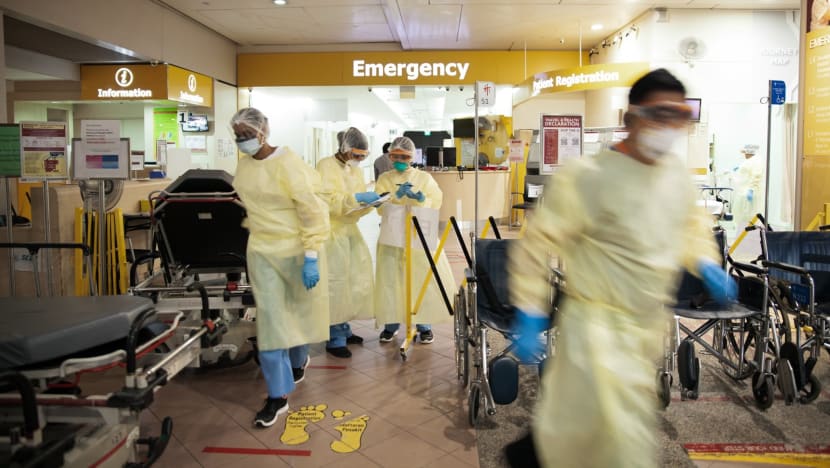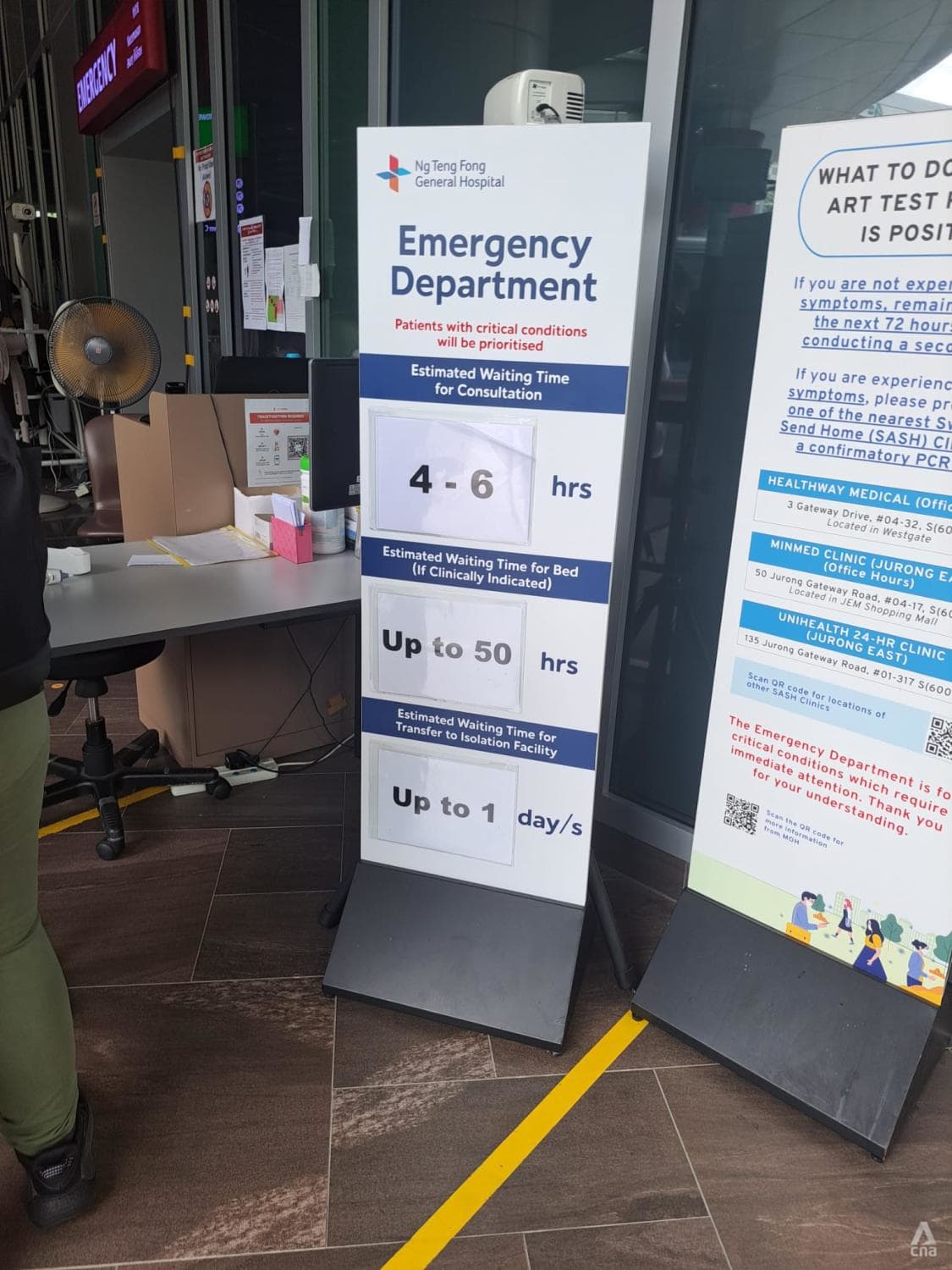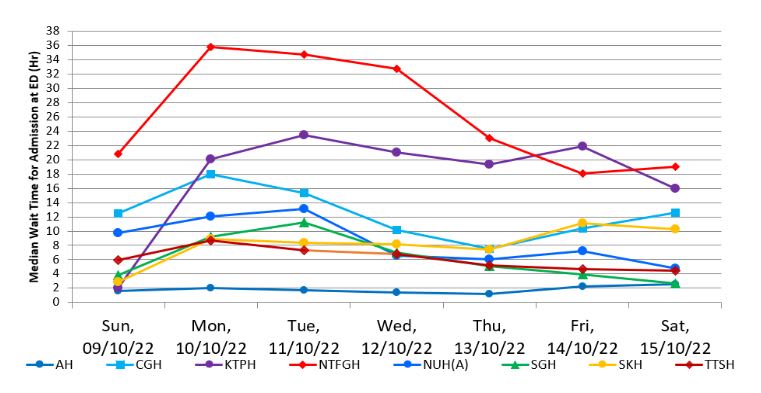www.channelnewsasia.com
Singapore
 File photo of the accident and emergency (A&E) department at Tan Tock Seng Hospital in Singapore. (Photo: Facebook/Tan Tock Seng Hospital)
File photo of the accident and emergency (A&E) department at Tan Tock Seng Hospital in Singapore. (Photo: Facebook/Tan Tock Seng Hospital)
21 Oct 2022 11:39PM (Updated: 22 Oct 2022 01:52AM)
SINGAPORE: Singapore's hospitals are seeing a high number of patients whose conditions do not require emergency care, healthcare bosses said in a joint statement on Friday (Oct 21).
Where possible, manpower has been redeployed to better support the high attendance at hospital emergency departments, said the group chairmen of the medical boards of SingHealth, National Healthcare Group and National University Health System.
"We have been monitoring the situation closely and adjusting our response accordingly to optimise resources for both COVID-19 and non-COVID-19 patients," said the statement.
The hospitals' triage process includes having emergency clinicians review the cases for admissions to ensure appropriate right-siting and avoid unnecessary admission.
Since the start of the year, emergency departments have been experiencing a very high volume of patients.
"This is aggravated when there is an infection wave, such as over the past few weeks," said the statement.
"We are working closely with the Ministry of Health to optimise and adjust capacity, resources, protocols, and manpower to care for our patients and keep our staff safe."
The waiting time for admission at some hospitals has surged to as high as 50 hours.
 A sign outside Ng Teng Fong hospital's emergency department on Oct 19, 2022, stating that waiting times could go up to 6 hours for a consultation and 50 hours for a bed. (Photo: CNA reader)
A sign outside Ng Teng Fong hospital's emergency department on Oct 19, 2022, stating that waiting times could go up to 6 hours for a consultation and 50 hours for a bed. (Photo: CNA reader)
Priority will be given to patients with more serious conditions and who require admission. Those with potentially life-threatening or medically urgent conditions will be attended to quickly, and sicker patients who require close monitoring will get a bed sooner based on acuity and priority, they said.
Patients with lower acuity conditions will experience a longer wait time to transfer to the ward.
Inpatient care will start at the emergency department with specialty doctors reviewing, assessing and planning for the appropriate treatment before the ward transfer.
"We seek the public’s understanding that longer waiting time is expected at our emergency departments," said the group chairmen of the medical boards.
They urged people, including children, not to visit the emergency departments unless it is for life-threatening conditions.
"For common and minor medical conditions, they should visit GPs and polyclinics, or consider teleconsultation with their doctor," the statement said.
Patients who walk into emergency departments with non-emergency conditions may be diverted to other urgent care clinics or primary care clinics for further assessment. This is to prioritise the resources for those who need acute hospital care.
 Daily median waiting time for admission at hospital emergency departments in Singapore, from Oct 9 to Oct 15, 2022. (Graph: MOH)
Daily median waiting time for admission at hospital emergency departments in Singapore, from Oct 9 to Oct 15, 2022. (Graph: MOH)
Members of the public who need COVID-19 testing or a review of acute respiratory infection symptoms can visit the Public Health Preparedness Clinics for further assessment.
Stable patients are referred to home recovery programmes, such as NUHS@Home, SGH@Home and Yishun Health Medical Home, or community sites such as COVID-19 treatment facilities as appropriate.
"There are dedicated facilities and manpower to support the care of COVID-19 patients," the statement said.
Hospitals have set aside beds that can be converted to isolation beds, and holding facilities for suspect cases pending their results.
Alternative arrangements, where clinically appropriate, are also offered. These include teleconsultation, telerehabilitation, telemonitoring, remote prescribing, and delivery of medication.


"While we work hard to provide care for our patients, we recognise our staff need time to rest and recharge."
Besides the heavy workload and long working hours, a significant part of staff burnout is also due to abuse, they added.
"We take a zero-tolerance stance towards deliberate abuse against our staff and will take action to protect them," they added.
"There are protocols in place that assure staff they can safely seek redress from abuse they may face from patients and caregivers, and get the support they need. We seek the public’s patience and cooperation to help create a safe environment for our staff to do their best to care for patients."
Staffing needs are managed through advance planning and staggered rostering of leave. This ensures that staff are able to go on leave by turns, or return to their home country.
"Given the prolonged duration of this pandemic, we have stepped up efforts to monitor the well-being of our staff, including their psychological health," the group chairmen of the medical boards said.
"We provide mental health support where required, and encourage staff to support and look out for one another."
Singapore
Singapore hospitals seeing high number of patients who do not need emergency care: Healthcare bosses
Healthcare bosses said they will take a zero-tolerance stance towards deliberate abuse of staff.
21 Oct 2022 11:39PM (Updated: 22 Oct 2022 01:52AM)
SINGAPORE: Singapore's hospitals are seeing a high number of patients whose conditions do not require emergency care, healthcare bosses said in a joint statement on Friday (Oct 21).
Where possible, manpower has been redeployed to better support the high attendance at hospital emergency departments, said the group chairmen of the medical boards of SingHealth, National Healthcare Group and National University Health System.
"We have been monitoring the situation closely and adjusting our response accordingly to optimise resources for both COVID-19 and non-COVID-19 patients," said the statement.
The hospitals' triage process includes having emergency clinicians review the cases for admissions to ensure appropriate right-siting and avoid unnecessary admission.
Since the start of the year, emergency departments have been experiencing a very high volume of patients.
"This is aggravated when there is an infection wave, such as over the past few weeks," said the statement.
"We are working closely with the Ministry of Health to optimise and adjust capacity, resources, protocols, and manpower to care for our patients and keep our staff safe."
The waiting time for admission at some hospitals has surged to as high as 50 hours.

PRIORITY FOR PATIENTS WITH SERIOUS CONDITIONS
To free up more capacity, some non-urgent elective surgeries and admissions are also being deferred. This will help to preserve hospital beds and manpower, said the statement.Priority will be given to patients with more serious conditions and who require admission. Those with potentially life-threatening or medically urgent conditions will be attended to quickly, and sicker patients who require close monitoring will get a bed sooner based on acuity and priority, they said.
Patients with lower acuity conditions will experience a longer wait time to transfer to the ward.
Inpatient care will start at the emergency department with specialty doctors reviewing, assessing and planning for the appropriate treatment before the ward transfer.
"We seek the public’s understanding that longer waiting time is expected at our emergency departments," said the group chairmen of the medical boards.
They urged people, including children, not to visit the emergency departments unless it is for life-threatening conditions.
"For common and minor medical conditions, they should visit GPs and polyclinics, or consider teleconsultation with their doctor," the statement said.
Patients who walk into emergency departments with non-emergency conditions may be diverted to other urgent care clinics or primary care clinics for further assessment. This is to prioritise the resources for those who need acute hospital care.

Members of the public who need COVID-19 testing or a review of acute respiratory infection symptoms can visit the Public Health Preparedness Clinics for further assessment.
Stable patients are referred to home recovery programmes, such as NUHS@Home, SGH@Home and Yishun Health Medical Home, or community sites such as COVID-19 treatment facilities as appropriate.
"There are dedicated facilities and manpower to support the care of COVID-19 patients," the statement said.
Hospitals have set aside beds that can be converted to isolation beds, and holding facilities for suspect cases pending their results.
Alternative arrangements, where clinically appropriate, are also offered. These include teleconsultation, telerehabilitation, telemonitoring, remote prescribing, and delivery of medication.

Longer waiting times at hospitals with some patients told to wait up to 50 hours for a bed

Curbs on number of visitors, duration of visits at hospitals and residential care homes as COVID-19 cases rise
STAFF WELFARE
"As part of the national efforts against COVID-19, our healthcare team has held the line for Singapore with significant personal sacrifices," said the statement."While we work hard to provide care for our patients, we recognise our staff need time to rest and recharge."
Besides the heavy workload and long working hours, a significant part of staff burnout is also due to abuse, they added.
"We take a zero-tolerance stance towards deliberate abuse against our staff and will take action to protect them," they added.
"There are protocols in place that assure staff they can safely seek redress from abuse they may face from patients and caregivers, and get the support they need. We seek the public’s patience and cooperation to help create a safe environment for our staff to do their best to care for patients."
Staffing needs are managed through advance planning and staggered rostering of leave. This ensures that staff are able to go on leave by turns, or return to their home country.
"Given the prolonged duration of this pandemic, we have stepped up efforts to monitor the well-being of our staff, including their psychological health," the group chairmen of the medical boards said.
"We provide mental health support where required, and encourage staff to support and look out for one another."



